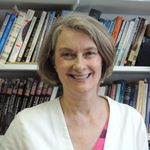News of the extended network of faculty, alumni, students, visiting researchers, and mission partners is regularly updated, and some of the big ideas or major events in Global Christianity are covered in the CGCM News.
Missions and the Local Church
 On April 2, Laura Chevalier, Doctoral Fellow at the CGCM, presented a paper at the Northeast meeting of the Evangelical Missiological Society (EMS) in Flushing, NY. In her paper entitled "Midwives and Mamas of the Local Church: Historical Case Studies of Women in Mission," Chevalier looked at the life writing of two twentieth century evangelical missionaries: Lillian Trasher and Dr. Helen Roseveare. She drew out five themes regarding the local church and mission in their writings and concluded by discussing what these women's lives and writings bring to bear on evangelical mission today. The conference brought together a broad spectrum of people in the evangelical community including mission scholars and practitioners, pastors, and many lay leaders from a wide variety of denominations. Concurrent paper sessions offered in both Chinese and Spanish during the afternoon session highlights the attention to diversity by conference organizers and the diverse backgrounds of participants.
On April 2, Laura Chevalier, Doctoral Fellow at the CGCM, presented a paper at the Northeast meeting of the Evangelical Missiological Society (EMS) in Flushing, NY. In her paper entitled "Midwives and Mamas of the Local Church: Historical Case Studies of Women in Mission," Chevalier looked at the life writing of two twentieth century evangelical missionaries: Lillian Trasher and Dr. Helen Roseveare. She drew out five themes regarding the local church and mission in their writings and concluded by discussing what these women's lives and writings bring to bear on evangelical mission today. The conference brought together a broad spectrum of people in the evangelical community including mission scholars and practitioners, pastors, and many lay leaders from a wide variety of denominations. Concurrent paper sessions offered in both Chinese and Spanish during the afternoon session highlights the attention to diversity by conference organizers and the diverse backgrounds of participants.
Vincent Machozi Memorial Services
On April 26th, life and death of Father Vincent Machozi, A.A. was remembered during a memorial service to be held in the Boston University Marsh Chapel. The service began at 2:00 pm, and included various people from the communities Father Machozi overlapped with in Boston, such as the School of Theology, African Studies, the Assumptionists, Congolese immigrants, and the Church of the Immaculate Conception.
Recently, a service was held for him at the Church of the Immaculate Conception in Everett, Massachusetts, and his funeral was held in the Democratic Republic of Congo.
Exploring Sports and Spirituality in the Classroom
The city of Boston is a sports-loving city with thousands of people following sports religiously. But what is the connection between sports and spirituality? Some scholars are exploring that very question. Boston University School of Theology alum Mark Stamm teaches a course precisely on the connection between sports and spirituality in American culture. Dr. Stamm (STH, Th.D. '95) is a Professor of Christian Worship at the Perkins School of Theology at Southern Methodist University in Dallas, Texas. Nurtured in the loved Boston Red Sox baseball team in his time at BU, Dr. Stamm belongs to the Society for American Baseball Research. He explores how baseball and other sports impact on Christian faith, spirituality, and even liturgy. You can read more about his fascinating course in the article on Sports and Spirituality by Sam Hodges.
Mission and Friendship
On March 30th, Dana Robert delivered the annual Donald A. Yerxa Lecture in History at Eastern Nazarene College. She probed the role of "Cross-Cultural Christian Friendships in the Age of Nationalist Revolution, 1950s-1970s," asserting that these close connections were costly in the midst of shifting political arrangements, but that they were important reminders that Christianity was a multi-ethnic, global religion. Christian friendships that did not collapse under the extraordinary pressure and violence of nationalism underscored the reality of world Christianity.
The lecture also pointed to another type of enduring friendship. Dana Robert has been the reader for four dissertations written by Nazarene scholars. All four were able to attend the lecture and are pictured below.

Vincent Machozi (’15) Laid Down His Life for Peace

Sunday, March 20th, Father Vincent Machozi, A.A. was murdered for his work in documenting the human rights abuses that were happening in the Democratic Republic of Congo. Machozi had been a ThD student in Mission Studies and Ethics, but returned to Congo before completing the degree in hopes that he could speak out agains the atrocities that were being committed in eastern Congo.
A memorial service will be held at Boston University. For fuller coverage of the story, BU Today, Crux, and the Assumptionists have each published accounts of the heroic life and tragic death of Rev. Machozi.
Dana Robert named Luce Fellow
 Dana L. Robert, Director of the Center for Global Christianity & Mission, was selected a Luce Fellow for 2016-2017 by the Association of Theological Schools and the Henry Luce Foundation. Selected on the basis of the strength of her proposal to conduct creative and innovative theological research, Professor Robert will conduct yearlong research on “Transnational Friendships and Fellowship in the Making of World Christianity.” At the conclusion of her research, she will meet with the other Fellows to present her work, before moving it to publication.
Dana L. Robert, Director of the Center for Global Christianity & Mission, was selected a Luce Fellow for 2016-2017 by the Association of Theological Schools and the Henry Luce Foundation. Selected on the basis of the strength of her proposal to conduct creative and innovative theological research, Professor Robert will conduct yearlong research on “Transnational Friendships and Fellowship in the Making of World Christianity.” At the conclusion of her research, she will meet with the other Fellows to present her work, before moving it to publication.
Grant Application: North American Academy of Ecumenists
The North American Academy of Ecumenists is accepting applications for it Brother Jeffrey Gros Memorial Fund, a grant to support students to attend the NAAE at the Candler School of Theology, in Decatur, Georgia (September 23-25, 2016).
The application deadline is June 15, 2016.
WHO: Open to current undergraduate and graduate students with an interest in Christian unity.
EASY APPLICATION: Tell us (2 pages maximum) about your academic studies, your involvement in the church, and how you envision greater realization of Christian unity, including specific suggestions for unity which churches might employ. Email your text or attached file, in English or in French, to naae.prize@gmail.com no later than June 15, 2016. Applicants will be notified of results by August 1, 2016.
PRIZE: The prize is valued at $500 each. The students selected will have their registration fee and accommodations paid entirely by the Academy, and part or all of their travel expenses to participate at the 2016 NAAE conference in Candler School of Theology, Decatur, Georgia, September 23-24-25, 2016. The theme of this year’s annual conference, is “Commemorating the Reformation: Churches Looking Together Toward 2017 – and Beyond.”
ABOUT THE ACADEMY: The North American Academy of Ecumenists (NAAE) groups together leading scholars and church leaders from colleges, universities and seminaries throughout North America. The Academy meets annually in September and is affiliated with the Journal of Ecumenical Studies.
For more information about the Academy, visit www.naae.net
Uncovering Women’s Mission Stories
The BBC has produced an article about a unique book published in 1942. A Tibetan scholar stumbled across Sue in Tibet in a second-hand book store. To have a female character as the central character in a book in the 1940s was unique, but even more fascinating with the historical accuracy of the tale. The scholar found the story so intriguing that she ended up tracking down the history of the author, Dorris Shelton Still, a missionary kid.
Not long ago, Visiting CGCM Researcher Cathy Corman found herself in a similar situation. Introduced to Barbara (Barry) Beach Alter, Dr. Corman became curious about her life as a missionary in India. The stories she heard were so compelling that she helped Barry construct an audio autobiography, In the Midst. The result is a multimedia presentation, and another small advance in uncovering the stories of women who have served in missions.
Assessment Symposium
 Friday, March 18th, Boston University will host its second Assessment Symposium. Laura Chevalier (PhD Candidate) will represent the School of Theology, and present "E-Portfolio as an Assessment Tool in the School of Theology." It is a tool Laura utilized in courses on mission as well as on spirituality.
Friday, March 18th, Boston University will host its second Assessment Symposium. Laura Chevalier (PhD Candidate) will represent the School of Theology, and present "E-Portfolio as an Assessment Tool in the School of Theology." It is a tool Laura utilized in courses on mission as well as on spirituality.
Popular Spiritual Movements in Southeast Asia
The Handbook on Popular Spiritual Movements (PSM) in Malaysia, Singapore and Indonesia was a research project and publication owned by Trinity Theological College (TTC), Singapore, under the leadership of Dr. Michael Poon, Director of the Centre for the Study of Christianity in Asia (CSCA). Boston University, through the Center for Global Christianity and Mission, was a supportive partner through the participation of Dr. Charles Farhadian (PhD 2000) as a co-editor, Dr. Dana Robert as a consulting editor, and the Drs. Septemmy Lakawa (ThD, 2011), Daryl Ireland (PhD 2015), and David Scott (PhD, 2013) as contributors to section III: Case Studies of Popular Spiritual Movements.
